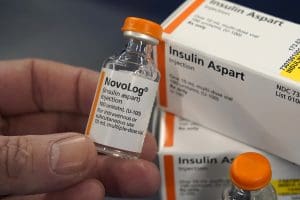Jackson bill seeks to lower the price of insulin, ease access for nonprofit manufacturers
More than 1 in 10 adults across Maine have diabetes

A legislative committee considered a bill Tuesday that seeks to lower the price of insulin, a crucial medication that some Mainers have struggled to afford.
LD 1793, sponsored by Senate President Troy Jackson (D-Aroostook), would require that insurance companies cover the lowest-price insulin available and not pass on any cost-sharing to patients. It would also waive registration fees for non-profit drug manufacturers to incentivize the sale of low-cost insulin in Maine.
Jackson said during a hearing on the bill Tuesday before the Health Coverage, Insurance and Financial Services Committee that the measure would help prevent Mainers with diabetes from having to make impossible decisions between affording a critical medication and buying other necessities.
“Nobody should face the choice between paying rent, buying groceries, keeping their lights on, and paying for a medication that they need to live,” Jackson said.
Vials of insulin are cheap to make, but costs increased dramatically over the past two decades before three of the drug’s primary manufacturers recently cut prices.
Some other organizations are trying to lower costs further by using a non-profit business model. One such group, Civica Rx, is looking to produce and sell insulin at a price that allows it to break even. The organization, which spoke in favor of Jackson’s bill, is one group that would benefit from the provision in the legislation that waives registration fees for non-profit drug makers.
Jackson’s bill would build on previous action taken in Maine in 2020 that limited insulin copays to $35 for a 30-day supply, which advocates said was a crucial step to help with affordability for the more than 1 in 10 adults across the state with diabetes.
Still, Kate Ende of Consumers for Affordable Health Care, who spoke in favor of LD 1793, said while the 2020 reform helped many people, $35 can still be a financial burden for some. Ende said that’s especially true when considering that diabetics often need other medical supplies and that the cost of those, in addition to the price of insulin, can quickly become unaffordable.
The bill received some opposition during Tuesday’s hearing, including from insurance companies. Kristine Ossenfort, director of government relations for Anthem Blue Cross and Blue Shield in Maine, said the proposal doesn’t address the root cause of the high cost of medications but instead “nibbles at other aspects.”
She also argued that limiting cost-sharing for the lowest-price insulin would create higher financial burdens for other consumers.
“This is the perennial squeezing of the balloon,” she said. “If you limit the cost shares, even for certain drugs, to zero, you’re just going to see it increase elsewhere in higher cost shares for other services, in higher out of pocket limits, or in higher premiums.”
Jackson’s bill comes as lawmakers are also trying to tackle the overall issue of prescription drug prices. A bill advanced by the committee earlier this month would authorize the Maine Prescription Drug Affordability Board to set an upper limit beginning in 2026 on what individuals would pay for one or more of the first 10 drugs that will be eligible for Medicare price negotiation under the Inflation Reduction Act.
Advocates have long argued that overall drug costs are a serious problem in the state, with a May 2023 survey finding 1 in 4 Mainers had rationed pills, skipped doses of a medicine or not filled a prescription due to price.
Nationally, the pharmaceutical industry rakes in billions annually even as an estimated 18 million people can’t afford the cost of drugs.
This story was originally published in the Maine Morning Star
Recommended

Biden campaign launches new ad focused on Affordable Care Act
Former President Trump has said he wants to do away with the popular health care law.
By Kim Lyons, Pennsylvania Capital-Star - May 08, 2024
Ohio doctors fear effects of emergency abortion care case set to go before U.S. Supreme Court
A federal law that allows emergency departments to treat patients without regard to their ability to pay will be under U.S. Supreme Court scrutiny this week, and Ohio doctors are concerned about the case’s local impact on emergency abortion care.
By Susan Tebben, Ohio Capital Journal - April 23, 2024
House GOP votes to end flu, whooping cough vaccine rules for foster and adoptive families
A bill to eliminate flu and whooping cough vaccine requirements for adoptive and foster families caring for babies and medically fragile kids is heading to the governor’s desk.
By Anita Wadhwani, Tennessee Lookout - March 26, 2024









































































